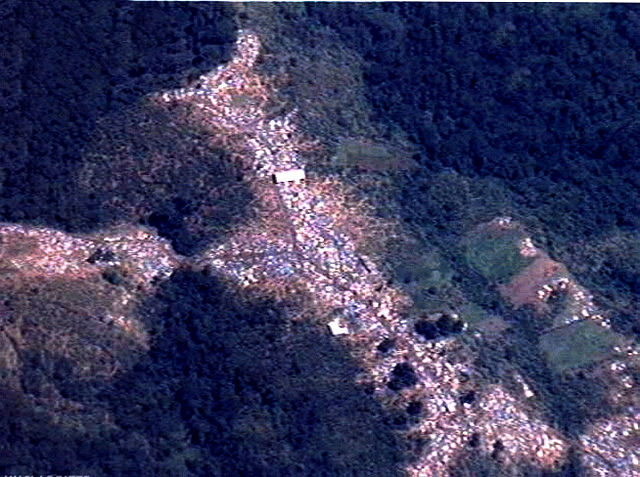Médecins Sans Frontières, also known as Doctors Without Borders, is a charity that provides humanitarian medical care. It is a non-governmental organisation (NGO) of French origin known for its projects in conflict zones and in countries affected by endemic diseases. The organisation provides care for diabetes, drug-resistant infections, HIV/AIDS, hepatitis C, tropical and neglected diseases, tuberculosis, vaccines and COVID-19. In 2019, the charity was active in 70 countries with over 35,000 personnel; mostly local doctors, nurses and other medical professionals, logistical experts, water and sanitation engineers, and administrators. Private donors provide about 90% of the organisation's funding, while corporate donations provide the rest, giving MSF an annual budget of approximately US$1.63 billion.
A child with kwashiorkor during the Nigerian Civil War
Aerial photograph of a Mihanda, Zaire refugee camp in 1996. Pictured are 500+ tents set up in the Mitumba Mountains.
An MSF outpost in Darfur (2005)
A Médecins Sans Frontières staff member adjusts Dr. Joel Montgomery, Team Lead for CDC's Ebola Response Team in Liberia, goggles before Montgomery enters the Ebola treatment unit (ETU), ELWA 3. MSF operates the ELWA 3 ETU, which opened on 17 August.
Biafra, officially the Republic of Biafra, was a partially recognised state in West Africa that declared independence from Nigeria and existed from 1967 until 1970. Its territory consisted of the former Eastern Region of Nigeria, predominantly inhabited by the Igbo ethnic group. Biafra was established on 30 May 1967 by Igbo military officer and Eastern Region governor C. Odumegwu Ojukwu under his presidency, following a series of ethnic tensions and military coups after Nigerian independence in 1960 that culminated in the 1966 anti-Igbo pogrom. The Nigerian military proceeded in an attempt to reclaim the territory of Biafra, resulting in the start of the Nigerian Civil War. Biafra was formally recognised by Gabon, Haiti, Ivory Coast, Tanzania, and Zambia while receiving de facto recognition and covert military support from France, Portugal, Israel, South Africa and Rhodesia. After nearly three years of war, during which around two million Biafran civilians died, President Ojukwu fled into exile in Ivory Coast as the Nigerian military approached the capital of Biafra. Philip Effiong became the second president of Biafra, and he oversaw the surrender of Biafran forces to Nigeria.

New Nigerian newspaper page, 7 January 1970. End of the Nigerian civil war with Biafra. "Owerri is now captured. Ojukwu flees his enclave." Photographs of the military Obasanjo, Jallo, Bissalo, Gowon.
A child suffering the effects of severe hunger and malnutrition during the Nigerian blockade





